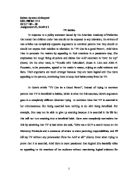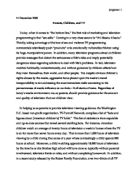Salma Ayman Al-Sayyad
SID: 900 04 1112
ECLT 102 - 30
Assignment #1, Draft # 2
TV babies
In response to a policy statement issued by the American Academy of Pediatrics that stated that children under two should not be exposed to any television, the writers of two articles use completely opposite arguments to convince parents that they should or should not expose their toddlers to television. In "TV Can be a good Parent", Ariel Gore tries to persuade the readers by appealing to their emotions in a passionate way. She emphasizes her tough living situations and claims that AAP statement is “over the top” (Gore). On the other hand, in “Trouble with Teletubies”, Susan E. Linn and Alvin F. Poussaint, to be persuasive, appeal to the reader’s reason, relying on solid evidence and facts. Their arguments are much stronger because they are more logical and thus more appealing to the parents, convincing them to keep their babies away from the TV.
In Gore's article “TV Can be a Good Parent”, Instead of trying to convince parents that TV in beneficial to babies, which is what the title assumes, Gore's arguments goes in a completely different direction trying to convince them that TV is essential in her circumstances. But being essential have nothing to do with being beneficial. For example, One may not be able to give up smoking because it is essential in his life but this will not turn smoking into a beneficial habit. Gore even completely contradicts her title by admitting that TV is bad when she said, “Give me a $175 a month house on the Monterey Peninsula and a commune of artists to share parenting responsibilities, and I'll kill my TV without any provocation from the AAP at all.” (Gore). Even when trying to prove that it is essential, Ariel Gore is more passionate than logical. She basically relies on appealing to the emotions of her audience without mentioning logical evidence for why TV can be a good parent. People do not automatically accept a point of view because they simply sympathize with the writer.







